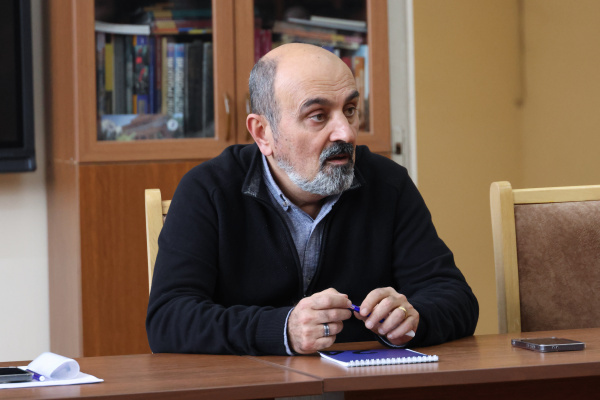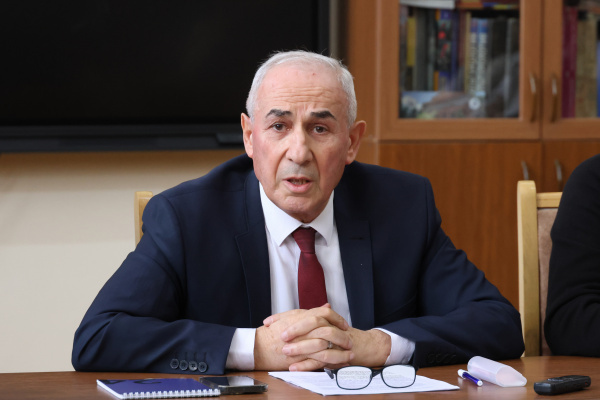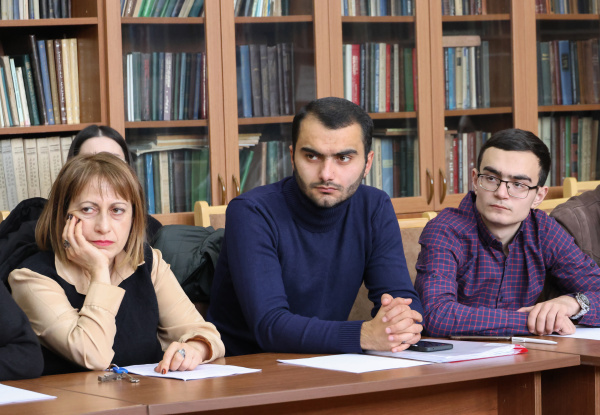YSU Faculty of History recently hosted a discussion titled "Integration of Studies on Armenia-Georgia-Iran Relations in Educational Processes", where university researchers presented their new approaches to incorporating integrated studies into educational systems.
During the discussion, the necessity of continuously conducting research on new geopolitical developments and integrating the findings into educational programs was emphasized.

The Dean of the History Faculty, Mkhitar Gabrielyan, highlighting the importance of such discussions, pointed out that the most important issue today concerns making knowledgeable individuals competitive in the market. "Students learn very well about the history of Georgia, Azerbaijan, and the North Caucasus, but we must strive to ensure that they can synthesize, analyze, and apply the results of their analysis, so they can become competitive specialists. This is the demand of the times, because following regional developments, we observe that the state which can quickly formulate an idea and move to action is the one that prevails."

The Head of the Chair of History of Neighboring Countries of Armenia and the Director of the Center of Georgian Studies, Eduard Zohrabyan, spoke about the issue of integrating research findings into the educational environment. He emphasized that there are currently solid foundations for studying many manuscripts, archives, and documents found in the libraries and repositories of the countries in the region, including Iran and Georgia, and for exploring the unexplored aspects of the region's history, with the aim of incorporating these studies into the educational environment.
"The creation of new knowledge will lead to the clarification of divergent viewpoints on certain issues, which can serve as the basis for the formation of new concepts. The concepts of the Soviet era, of course, can no longer be applied, as in a constantly changing world, concepts are continuously evolving. In particular, after the 2020 Artsakh war and the forced displacement of Artsakh people, we cannot follow the previous concepts and must try to substantiate the region's political landscape with new approaches, as well as our place and role in this region," said Eduard Zohrabyan.

Professor Kristine Kostikyan from the Chair of History of Neighboring Countries of Armenia presented the topic titled "The Integration of New Historical Research in the Course 'Iran and the Caucasus from Ancient Times to the Present Day'."
She discussed the topics covered in the course and highlighted that much of the research she and her colleagues have conducted pertains to various issues of Armenian-Iranian relations in the late medieval and early modern periods. "Although these studies are largely based on earlier research by Armenian and foreign orientalists, we have developed and enriched them by incorporating new source materials.

The event also featured reports by Associate Professor Beniamin Mailyan from the Chair of History of Neighboring Countries of Armenia (topic: "Teaching the Historiographical Issues of Abkhazia in the Context of General Georgian History") and Assistant Professor Susanna Serobyan from the same Chair (topic: "The Integration of Research into the Educational Process as a New Challenge").
At the end of the discussion, the faculty, students, and other interested participants posed questions to the speakers. The discussion was organized through the joint effort of the Chair of History of Neighboring Countries of Armenia and the Center of Georgian Studies.


